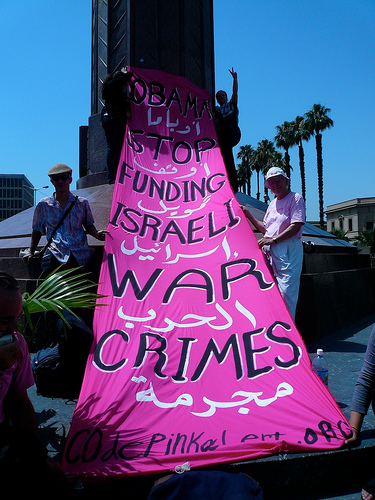President Obama was giving his speech to the Arab world while I was in Gaza, a few kilometres from the borders of Egypt along with 65 members of an international delegation.
We were, at that time, speaking with Mr. Samir Nasrallah. He is a local pharmacist who knew Rachel Corrie, the young American woman who was killed by an Israeli bulldozer in 2003 while she was trying to stop the bulldozer that was going to destroy his house.
Mr. Nasrallah, a thin tall man, and his wife came to meet us very briefly. He had a story to tell. A moving story shared by the 1.5 million Gazans trapped in this little piece of land called Gaza.
His words, while very simple and only lasting a few minutes, were very emotional and resonated in my ears for days and weeks to come. He told us that since the siege started in 2006 he can’t see his elderly parents who live in Cairo. He has been afraid they would die and he wouldn’t be able to see them again.
Many Gazans have stories to share with the rest of the world. The siege, the big prisons they live in, the lack of medication, the lack of building materials, the spare parts that need to be replaced in order to let the medical equipment (dialysis, imagery, scanner, etc) function again in order to diagnose patients’ many illnesses. Add on top of all this misery the fear and anxiety they live in on a daily basis. When will be the next incursion? Are we going to die?
I wished that President Obama could answer these questions. His words were almost scientifically chosen but they were incapable of removing the feelings of sadness and helplessness I had inside of me each time I remembered the children of the crowded streets in Jabalia camp or Nusairat camp which I visited with the delegation, running around us and following us with their hungry eyes full of curiosity.
His message of hope couldn’t erase from my memory the teary eyes of the young woman, who was working with UNRWA and helped us visit many places in Gaza, when we boarded our bus and as she was left there looking at us dreaming that maybe one day leaving and entering Gaza can be part of the normal routine.
Before leaving my comfortable and so organized country, Canada, I had my doubts about being allowed to enter Gaza and see with my own eyes the humanitarian situation there. Indeed the crossing points from the Israeli border and the Egyptian border were all closed for the last few months. Only the Rafah border from the Egyptian side was opened sporadically and some humanitarian aid was allowed to enter from there as well as some foreign delegations.
Many times during the six days I spent in Gaza, I wished the whole international community could see the level of destruction and the misery I saw in those long busy days. Some of the minarets, from which come the recorded voice of the muezzin call for prayers five times a day, were brought down to earth by some missiles or bombs. Buildings of the Islamic University of Gaza were totally destroyed; they contained laboratories where students were supposed to discover and learn. The Shifa hospital still bears the scars of the bombs and the shells that were sent towards it.
A school in Jihr El Dik, a Bedouin village near the Israeli border, was half destroyed not to mention the many houses in many neighbourhoods which were not rebuilt and still offered their wounds to the sun, wind and to visitors like us. Even the Palestinian Legislative Council wasn’t exempted from the destruction. The elected members lost the only place they had to discuss the questions relevant to the lives of the population.
Everywhere I went in Gaza, there was a picture, a person, a place, a building to testify or to remind me that a terrible war had happened and that only a lifting of the siege can bring some hope to the people.
Monia Mazigh was born and raised in Tunisia and immigrated to Canada in 1991. Mazigh was catapulted onto the public stage in 2002 when her husband, Maher Arar, was deported to Syria where he was tortured and held without charge for over a year. She campaigned tirelessly for his release during that time and has written a book, Hope and Despair, about her pursuit of justice.
Mazigh and others have participated in delegations to Palestine organized by Codepink this year. You can read more of their reflections from Gaza here.



